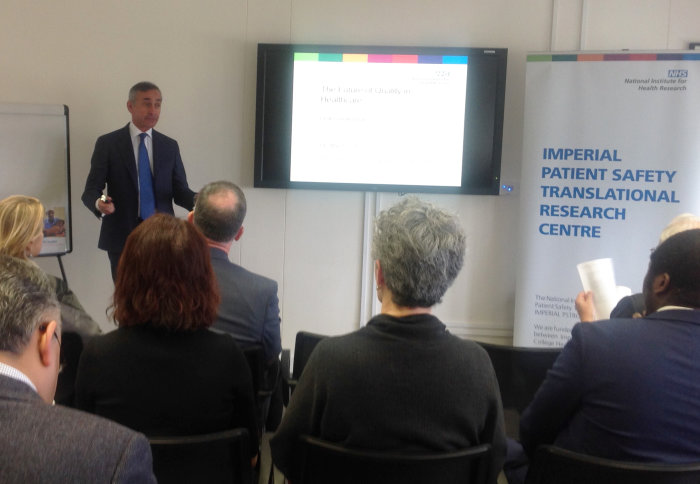NIHR Imperial PSTRC host global patient safety Committee
by Jo Seed

Professor Ara Darzi speaking at the third and final NASEM Committee on Improving Quality of Healthcare Globally.
NIHR Imperial Patient Safety Translational Research Centre within IGHI hosted 3rd & final NASEM Committee on Improving Quality of Healthcare Globally.
“How do we make the NHS a safer learning system whilst achieving value for money?” asked Professor Ara Darzi at the third National Academies of Sciences, Engineering and Medicine (NASEM) Committee Meeting hosted last week by Imperial’s Patient Safety Translational Research Centre within the Institute of Global Health Innovation.
The NASEM Committee is focused on improving the delivery of quality healthcare now and in the future, especially within low resource settings. It is composed of global leaders in healthcare quality and co-chaired by Donald Berwick and Sania Nishtar.
The Committee has been set up to meet three times in different locations across the world with a separate focus for each meeting.
The focus of the third meeting was on the future of healthcare quality and safety and the goal of the event was to assist the commissioners in developing recommendations for their report based on where we see health systems going in the future.
The meeting was chaired by Don Berwick, co-Chair of the Committee and heard from speakers including Dr. Alain Labrique, Director of JHU Global mHealth Initiative and Associate Professor at Johns Hopkins Bloomberg School of Public Health, who discussed health systems of the future, digital health and governance.
In October 2016, the World Health Organization (WHO) published a set of guidelines which recognised digital health as a formal tool for global health strengthening.
It’s not just about new shiny technology. Digital health by itself won’t solve the challenges – systems thinking is also needed. Dr. Alain Labrique Director of JHU Global mHealth Initiative
Dr Labrique stated that in order to harness current innovations in healthcare and improve patient safety, we need to see digital health as a health systems catalyst and to listen to the end user. “It’s not just about new shiny technology” said Dr Labrique. “Digital health by itself won’t solve the challenges – systems thinking is also needed”.
Dr Peter Buckle, Principal Research Fellow in Human Factors at Imperial was the second keynote of the day, who discussed his latest report on human factors in healthcare. Peter suggested that people make mistakes because systems have been poorly designed and by taking a human factors approach, we can create more opportunities to reduce patient risk through improving design processes and procedures.
Human factors recognises the interaction between different components of a system and can help to provide a better-informed view in order to create digital systems that work for the end users. Dr Peter Buckle Principal Research Fellow in Human Factors at Imperial
“All systems are designed and used by humans, but there has been and remains a tendency for healthcare systems to evolve rather than be designed” said Dr Buckle. “Digital healthcare is huge and most of it has arrived where it is with very little risk assessment on safety and end user satisfaction. Human factors recognizes the interaction between different components of a system and can help to provide a better-informed view in order to create digital systems that work for the end users. A top-down and bottom-up approach is a must in order to see the issues from all angles”.
During the meeting, PSTRC and IGHI experts facilitated breakout sessions for the Committee on topics including behavioural insights, human factors, digital applications, advanced analytics and artificial intelligence and partnering with patients and carers. The recommendations from these breakout sessions were then fed back to the wider group for further discussion and debate.
“The final report of the Committee has not reached any conclusions yet” said Don Berwick and we are very grateful to all attendees of the meeting for their insightful input. The comments and recommendations from the presentations and the breakout sessions will be duly considered in finalising our upcoming report”.
The public meeting was then followed by a two-day private meeting of the Committee later that week.
Further information about the work of the NASEM Committee can be found on their website.
Article text (excluding photos or graphics) © Imperial College London.
Photos and graphics subject to third party copyright used with permission or © Imperial College London.
Reporter
Jo Seed
Institute of Global Health Innovation